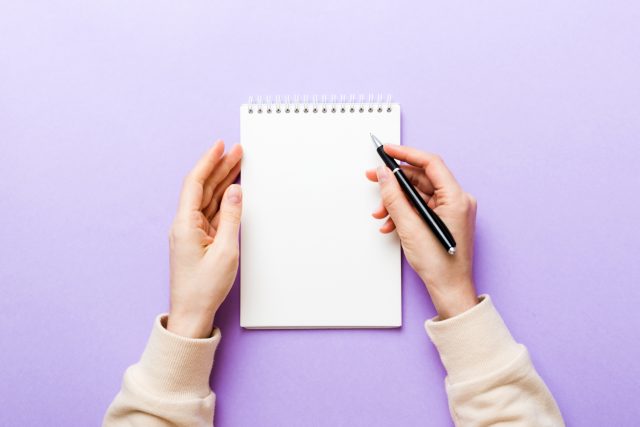This website uses cookies so that we can provide you with the best user experience possible. Cookie information is stored in your browser and performs functions such as recognising you when you return to our website and helping our team to understand which sections of the website you find most interesting and useful.
Have you been ‘hoodwinked’ by a female journalist?
On International Women’s Day, db’s editor Sarah Neish explores some of the challenges faced by female journalists in 2024.

International Women’s Day is a rare opportunity to take an unflinching look at not only how much space we take up in the world, but exactly which spaces we occupy, including the work space, where according to a recent study we spend one third (90,000 hours) of our lives.
In my near 20 years as a published writer, I have found that to be a female journalist is to often be the questioned, not the questioner.
Whether that’s “who is she to write about that?” Or the all too frequent: “I never said that! How could you?”, the role in its traditional sense is frequently reversed.
I’ve seen time and again that when a ‘friendly’ female journalist writes a piece of analysis, interviewees often feel hoodwinked. There’s a sense of betrayal, a belief that they were somehow “lured into a false sense of security.” In other words, the interviewee wants to control the narrative, and feels frustrated at not being able to do so in a way rarely felt to the same degree with a male journalist – and this goes for whatever gender the interviewee identifies as.
Attend any Q&A session or press junket and there will be a journalist in the front row, pen poised, who will bark an uncomfortably direct, borderline-confrontational question to whoever is launching their new product, vintage, facility, financial results, or sustainability initiative. The drinks world is no exception.
Interestingly, this style of questioning is expected, planned for, relished even. Wine producers and company CEOs embrace it and see it as a challenge to be met head-on; a chance to showcase their oratory wizardry. Politicians, especially, thrive on the provocation. There is an element of performance, of dancing with the devil and surviving.
What’s enjoyed far less is the journalist who sits back, soaks it all in, joins up the dots and fleshes out an argument supported by the latest research, trends, data and historical context before carefully crafting a piece.
What people really hate is a journalist who holds up a mirror reflecting their own words back to them in the piercing light of day, without having first entered into a dual of words in front of a gathered audience. In view of centuries of social conditioning, I’ll give you three guesses which of these two camps female journalists tend to belong to.
I’m not saying this is the case for all female journalists. Nor is it a great hardship. It makes us stronger and better writers. We are more sure of ourselves because we must be, knowing that criticism will come. We research more thoroughly and keep increasingly meticulous records, anticipating that there is a good chance we ourselves will end up being interrogated.

Behold the bichon frisé
I’ve found that people think nothing of asking a woman writer to change the words in her article post-publication to better suit their agenda. To tell their story, rather than ours. In this industry, perhaps all industries, women are expected to ‘play nice’ rather than pursue the real scoop. To be a bichon frisé rather than a bloodhound.
A few years ago, the son of an extremely wealthy European wine family threatened me with the full weight of his dominion’s lawyers if I did not remove from my piece a topic that we discussed at length, in the presence of both his domestic and UK public relations teams. He wished he hadn’t said something, therefore he hadn’t.
I’ve lost count of the number of times female colleagues have been “corrected”, chastised and gaslighted, accused of sharing information that was told to them “off the record” when someone they’ve interviewed latterly regrets something they offered up willingly. Women setting the agenda and shining anything but a warm, fuzzy glow on their subject of choice (if indeed they have a choice) has never been a fan favourite.
What irks me, I suppose, is the implication that there is something underhand or duplicitous about the way in which female journalists acquire and use information. The content of a male writer’s article is overwhelmingly viewed as “nothing personal”; evidence that the individual is just “doing their job”. With women, it’s always personal.
I once attended a Downton Abbey press junket on behalf of a glossy magazine, where the media was divided across separate tables so that the cast could circulate between them. My table was furthest away from the door, and therefore last in line for the ‘talent’ to arrive. Having waited patiently for actress Michelle Dockery to reach my table, a gentleman journalist seated just ahead of me asked, with the subtlety and volume of a Kango drill, something so shocking and upsetting that Dockery turned immediately on her heel and left the room in tears. I never did get to interview her that day.
Bizarrely, the whispers in the room were that Dockery was the one who had acted unprofessionally, and that while the male questioner had undoubtedly thrown the cat among the pigeons – and been a bit of an arse – he had clearly been courageous, and in doing so secured himself a killer newspaper headline. Had it been a female journalist who had reduced one of the main cast members of the show to waterworks, the plot would, I suspect, have played out rather differently.
The subconscious message moments like this serve to underline is that if a male journalist asks a question, it demands an answer. There is rarely any suggestion that the question itself should not have been asked, nor by them.
On International Women’s Day I wish fellow journalists the confidence to ask whatever it is you want to ask today, and to ask it however you like (loudly, quietly, through the medium of song etc). Your voice matters, and I say that on the record.

